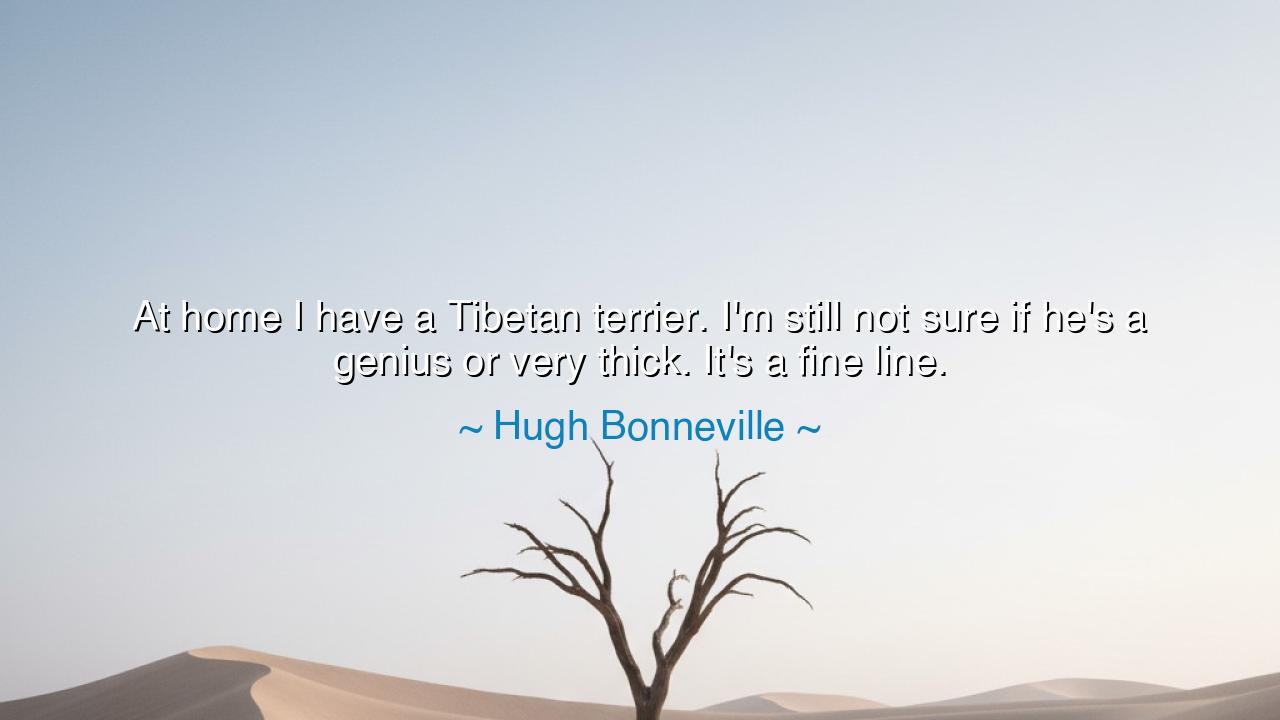
At home I have a Tibetan terrier. I'm still not sure if he's a
At home I have a Tibetan terrier. I'm still not sure if he's a genius or very thick. It's a fine line.






In the quiet doorway of evening, when lamps are lit and the world forgets its armor, a small creature becomes a teacher. “At home I have a Tibetan terrier. I’m still not sure if he’s a genius or very thick. It’s a fine line.” So speaks Hugh Bonneville, with laughter in his throat and wisdom folded beneath the jest. His words carry an ancient hint: that the measure between brilliance and blunder is narrow as a hair, and that love is what keeps us from judging too quickly when a companion stands with one paw in each realm.
Consider the breed named—Tibetan terrier—monks’ sentinel and traveler’s friend, a dog born of high plateaus where wind writes psalms across snow. Such creatures were said to bring luck, yet luck often arrives disguised as mischief. The animal who seems a genius when opening the gate may appear very thick when ignoring the open door in favor of head-butting the hinge. Thus the master stands astonished at a daily paradox: the same spirit that solves the puzzle invents the mess. The proverb replies: it is a fine line, and the line itself may be the game.
The ancients told of wise fools and foolish sages, for the border is thin as silk. A dog’s “error” may be a different grammar of attention: nose before notion, loyalty before logic. When a hound refuses a command to sit because a stranger’s step is wrong, is that disobedience—or discernment? So, too, the human heart: we call ourselves clever while missing the scent of kindness; we call another dull who senses danger we do not. The terrier becomes a mirror, showing us that intelligence without love is a bell with no clapper, and love without intelligence is a flame without wick.
Let a story be told as elders would. In Wales there is the legend of Gelert, the faithful hound. The prince returned to find the crib overturned and the dog blood-stained. Thinking the worst, he struck the hound down—only to discover a slain wolf nearby and the child unharmed. In that shattering instant, the fine line between “noble savior” and “dangerous beast” was revealed to be no line at all, but a veil of ignorance that love had failed to lift in time. The tale endures to warn us: perception is a skittish horse; do not ride it toward judgment without the bridle of patience.
There is comedy here, and rightly so. The pet who seems a genius for learning doorbells also believes thunder is a negotiable treaty. The one who can fetch a slipper across rooms cannot find it when it sits upon his own paw. But the laughter is medicine, not mockery. We laugh to soften certainty, to remember that our own minds chase their tails—bright at noon, bewildered at dusk. In this way, the dog’s “confusion” absolves our own; we grant to the animal the mercy we hope to receive.
From this small household parable grows a civic wisdom. Leaders, craftspeople, lovers—beware the swift verdict. What appears very thick may be undeveloped grace; what appears genius may be theatrical luck. Time is the truest examiner. Watch for repeatable goodness instead of dazzling accidents; prize temperament as highly as tricks. The fine line is crossed and re-crossed in every friendship, every workshop, every parliament. Hold your praise and your blame with open hands.
Take these counsels for the road. First, practice patient attention: before naming a thing foolish, look twice; before naming it brilliant, look thrice. Second, train with kindness—reward desired steps, and let mistakes become maps, not verdicts. Third, seek the unity of heart and head: pair affection with structure, play with ritual, spontaneity with recall. Fourth, remember the monk’s dog: keep companions who remind you to smell the world before you explain it. Finally, laugh gently and often; humor is the bridge over the fine line, carrying us from arrogance to wonder. Do this, and you will find that the little sage at home—whether genius or very thick by the day’s reckoning—has led you farther up the mountain than many learned books.






AAdministratorAdministrator
Welcome, honored guests. Please leave a comment, we will respond soon